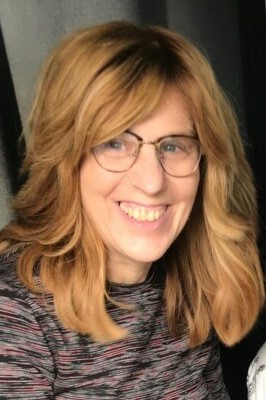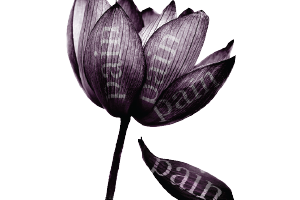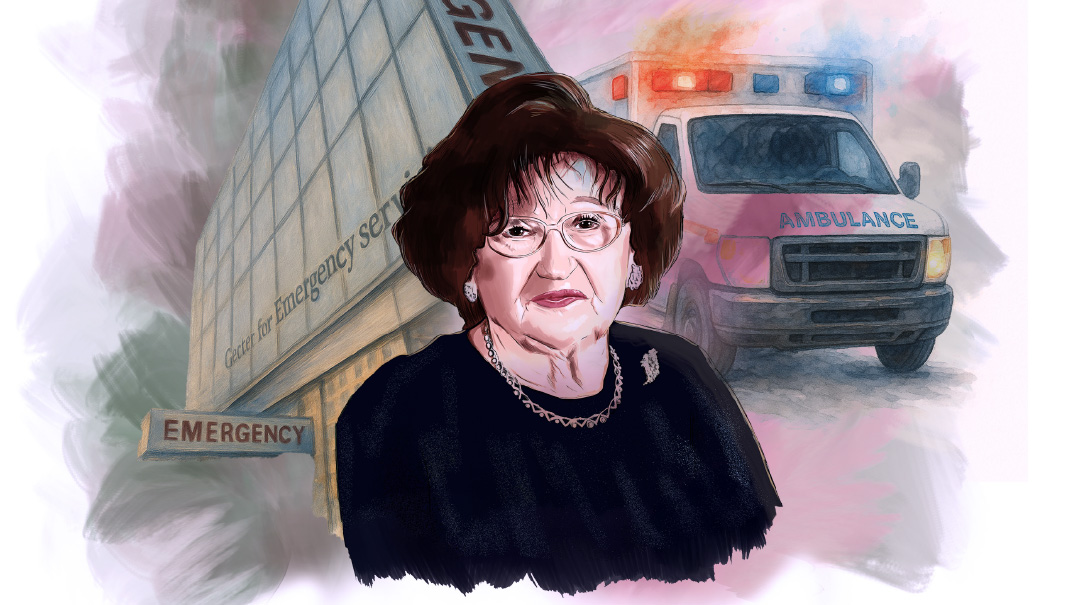Ripping Through my Pain

As told to Malkie Schulman by Meira (Marci) Reiss

Seventeen years ago, I was married for several years but not yet blessed with children. After a number of unsuccessful fertility treatments, our rabbi suggested we take a vacation before the next grueling round. My husband planned a wonderful trip to a beachfront resort in Dana Point, California.
Before we drove down, I developed a bad headache and took some over-the-counter headache medication. As we arrived at our destination, I could feel the pounding worsening, so I popped a few more pills. Late the next day, as we were strolling along the beach, I was hit with stomach pain so intense, I could barely breathe. I doubled over in a cold sweat. I managed to get back to the hotel where I locked myself in the bathroom.
I was in terrible pain and hemorrhaging from my intestines. It’s hard to believe now that my husband and I — two intelligent young adults — let this go on for hours, but we were in shock. Finally, after ten hours of bleeding, I called my older brother, then a young doctor. He told me to get to an emergency room immediately.
At the hospital, I was admitted and stabilized with fluids and pain medication. They prepared me for a colonoscopy to check for Crohn’s disease. Right afterward, the doctor told me the results. As I lay recovering in the endoscopy suite, I had no idea that my life was to irrevocably change as he informed me that I did indeed have Crohn’s disease.
One after another, thoughts went tearing through my mind. What was Crohn’s disease? Anything with the word disease sounded ominous to me — would this stop me from having a family? Could I hold down a job? What would happen to my marriage? Was I going to suffer? Was this going to kill me? The worst part was that the doctor gave me no further explanation after the initial pronouncement. My husband and I were left to figure out the implications on our own.
I left the hospital 24 hours later with a diagnosis of an incurable disease and a Hep-lock (the end of an IV in my arm to administer countless little vials of steroids). Oh, and a follow-up appointment for the next week.
A Painful New World
Very quickly I learned the foreign language of disease, symptoms, remission, tubing, steroids, and insurance. I learned that Crohn’s disease is an autoimmune digestive disease; that is, abnormal functioning of the immune system causes inflammation in the intestines. Typically, this inflammation results in pain, diarrhea, urgency, bleeding, and fevers. (I had none of those other symptoms — just the bleeding.)
Since Crohn’s is an autoimmune disease, the drugs prescribed are immunosuppressants. This means they hold back the immune system to prevent the body from attacking itself. In a healthy person, these medications would cause their immune system to underwork, weakening it, leaving the body susceptible to infection.
In the endoscopy suite, when I was told I had Crohn’s, I decided I would do everything in my power to make sure no Crohn’s patient was given a diagnosis the way I was. This was no way to introduce a patient to an incurable illness. To have a frightening disease was devastating enough; leaving patients without answers, support or hope when the ground is crumbling underneath them is sheer cruelty. Meanwhile, my husband and I went home to try to piece our life back together. It took several months, but soon the doctor confirmed my bowel was healed and I was in remission.
Thankfully, just a few months later, I found I was expecting. Shortly afterward, I started experiencing stomach cramps. The doctor said it was a flare-up of my Crohn’s. Pumped with steroids to quiet my symptoms, I began experiencing agonizing intestinal pain and diarrhea, and my face blew up to an unrecognizable size. I went into preterm labor at 23 weeks. The medication I was put on to stop labor left me bedridden. My body felt like it was on fire. At 29 weeks I delivered a two-pound, 12-ounce baby boy. His journey to survival was long and arduous.
This first pregnancy experience scarred me, so I was frightened when I became pregnant again two years later. This time was even worse. I contracted an infection and developed a fever that spiked to 104, placing me and my baby at great risk. The doctors were trying to keep me alive and keep the fever down so the baby wouldn’t be harmed. I was given massive doses of antibiotics and other medications to prevent a second preterm delivery. Somehow I made it through and delivered a healthy boy at 38 weeks.
Building a Support System
Although my married life was one harrowing medical crisis after another, I still managed to finish my master’s in social work during this time. I had not forgotten my determination to use my pain to support others who were enduring a similar battle with Crohn’s disease or ulcerative colitis, together known as inflammatory bowel disease. (See sidebar.)
I approached the hospital where I was receiving care and explained that I wanted to create a psychosocial program for children with inflammatory bowel disease (IBD). The hospital was receptive and, once we got the necessary funding, the program was incredibly successful.
I developed a revolutionary approach to patient care — treating patients from a holistic and psychosocial perspective. Illness is frightening. Patients need more than just medicine when disease hits. They need to be educated about the foreign world they are about to navigate, and they need support as the crush of emotional waves and changing dynamics sweep through their families. They need a social worker on the medical team to pick up the pieces after the doctor drops the diagnosis bomb. When a serious illness strikes a family, discord and fighting often break out among family members. Without information and guidance from trained professionals on how to cope emotionally with illness, families can fall apart.
After three years, I left the hospital setting and established the IBD Support Foundation (IBDSF) to service adults as well. We’ve expanded to become an international organization available around the clock. I have my phone on me all day every day. Families call for guidance on managing family dynamics and the fears that come with illness or the endless unexpected crises. Often I act as the liaison to the doctor or medical team. I educate doctors about the psychosocial aspects of the disease so they can better understand the patients’ perspective.
Because of the increased incidence of IBD in the Jewish community, many frum people avail themselves of our services, though mostly in private — within the frum community, the stigma attached to the diagnosis prevents people from reaching out to others with the same experience. Patients and their families are so concerned about others finding out that they miss out on a crucial source of support.
A Brush with Death
Four years after the birth of my second son, my daughter was born. I was now raising three children and running an international organization. I was also constantly sick. Really, really sick. In 14 years, I racked up over 160 hospital admissions. My world revolved around doctor appointments, hospital procedures, blood tests, emergency room visits, and endless infections. I went to nutritionists, tried their diets. Nothing worked. I was only comforted by the knowledge that I was being treated by a top doctor at a top IBD center.
For ten years, I was on the strongest immunosuppressant medications. When asked how I survived, my answer is truthfully, “only by giving to others.” My rabbis, Rabbi Gershon Bess from my community and Rav Yitzchok Berkovits from Eretz Yisrael, both gave me great chizuk.
Perhaps the very worst year of my life began in March 2010. I contracted a strep infection and despite antibiotic treatment, it continued to worsen. I grew unbearably weak. My throat felt like it was filled with razor blades. Every inhalation was agonizing. Swallowing reduced me to tears. I was told I was septic with a resistant strain of streptococcus. I could hardly move from the pain of breathing. At the hardest point, my doctor sat with me and said that although they were trying to stay one step ahead of the bacteria, it wasn’t looking good. Ultimately, Baruch Hashem, I survived the sepsis but that was just round one with infections. There would be ten more in the next 14 months.
The eighth or ninth infection developed on the way back from my eldest son’s bar mitzvah in Eretz Yisrael. For seven hours straight, I was stuck in the airplane lavatory. I was whisked away in a wheelchair as soon as we landed and transported to the hospital.
At this point I was emaciated with no end to my misery in sight. My brother, by now a respected gastroenterologist, stepped in. For years he had kept silent out of respect for my doctor who believed that as a family member, my brother was too subjective to be involved in my care. After another infection, however, my brother lost it. He told me that I would die from the infections if I didn’t change my treatment plan. He demanded that I go to another specialist.
New Lease on Life
I followed his advice. For a while, I had been in contact professionally with a leading IBD specialist from the Mayo Clinic in Minnesota who had relocated to San Diego. Like me, he believed the best way to practice medicine involves incorporating psychosocial care into treatment. Despite our time working together, we had never discussed my personal story. After my brother’s outburst, I approached him to ask if he’d take me on as a patient. He agreed and, as with all patients, he asked for all of my records since the initial diagnosis 14 years earlier.
This expert doctor reviewed my records carefully and put me through many tests and consultations. And then, as it happened 14 years before, once again my life was irrevocably altered by a doctor’s words.
The doctor gently told me that there was no evidence to suggest that I had ever had Crohn’s disease. He seemed quite sure and suggested the Mayo Clinic reevaluate my original pathology slides, the ones that had been used to diagnose Crohn’s disease.
The reevaluation came back definitively as ischemic colitis, an inflammatory injury to the bowel due to inadequate blood supply. The initial bleed years before was caused by an adverse reaction to the drug I had taken for my headache. It was a one-time event. Had it been left alone, it would have healed on its own without medication!
I listened in shock.
Crohn’s disease had been the backdrop to my life for the previous decade and a half. I took medicine — awful medicine with awful side effects that had almost cost me my life. I was hospitalized countless times. Crohn’s disease and its treatments made pregnancies incredibly complicated and prevented me from having more children. I didn’t have Crohn’s disease? I had never had it?
What about all of my tests and evaluations? My doctor always told me I had severe, aggressive Crohn’s disease. It didn’t make sense. And then I read through my own medical records for the first time. To my complete disbelief, they showed normal results. Endless normal results! My doctor’s interpretation of my symptoms had been inconsistent with the objective test findings.
It was all nearly impossible to process. Even this new doctor found it difficult to comprehend — how a woman could be tortured for years by a disease she did not have.
I left his office, went home and told nobody. I was stunned. Meanwhile, he took me off all medication. Immediately, my body experienced massive drug withdrawal. It seemed as though every nerve in my body was firing. My joints were in agony. I could hardly grip the steering wheel of my car.
Since it was almost too much to believe, the doctor suggested I get another opinion. When the second IBD expert reviewed my case, he called me to say, “How could this have happened?!” Hearing the emotion in his voice, I felt anger for the first time, then devastation.
A Brighter Future
After three months of drug withdrawal, my symptoms melted away. I was pain-free at last.
Physically, that is. To heal from the emotional pain however, the process had just begun.
Looking forward, I realize that I have been given a gift that those who suffer from serious illness only dream about. I have been released from bondage, given a chance to be “normal.”
Physically, I have gone from incredible weakness to boundless energy. I have gone from living much of my life in the bathroom to quick daily visits. I have gone from being unable to be physically present with my children to being able to do everything with them.
It is a whole new world.
When I look back, it is almost unbearable. The misdiagnosis of Crohn’s disease stole 15 years of my life.
The part that is so blatantly obvious is Yad Hashem. I was undoubtedly tortured. I endured virtually every medication, every side effect, every test for Crohn’s disease. But I used that pain to help every patient I could reach to alleviate some of their suffering. Then it became time to make me healthy, so that I could take my work — and my life — to the next level.
I look at the foundation I have built, which began as a result of my pain and desperate desire to alleviate others’ suffering. My message to my patients and to all those who suffer is, there is always hope. My second message is pragmatic: always get a second opinion. Finally, I want to make sure all IBD sufferers realize they are not alone. The IBD Support Foundation is there for you.
My new doctor summed it up as he gently led me down the extraordinarily emotional and painful road to health: “You spent every sick day of your life taking care of patients. You will be able to do so much more for them now that you’re going to be well.”
I intend to do just that.
What is IBD?
Inflammatory bowel disease (IBD) is a blanket term for conditions that involve inflammation of the gastrointestinal tract. Crohn’s disease and ulcerative colitis are the two most common of these conditions. In Crohn’s disease, inflammation may be found anywhere along the gastrointestinal tract, from mouth to anus, and throughout all layers of the bowel wall, causing ulceration and bleeding. Ulcerative colitis differs in that inflammation only occurs in the lining of the large intestine (colon and rectum).
Symptoms
Ulcerative colitis is usually accompanied by diarrhea, abdominal cramps, nausea, recurrent fever, and rectal bleeding. Other symptoms may include: fatigue, weight loss, joint pain, liver problems, loss of body fluids, and swelling and redness of the eyes.
Symptoms of Crohn’s disease include: pain in the abdomen, often in the lower right side, diarrhea, weight loss, and sometimes bleeding.
Both illnesses are chronic and include periods of relapse and remission.
Disease Management
There is no known cure for IBD at this time, but with proper management, most people have a normal life span and many enjoy good quality of life. Typically a treatment plan includes some or all of the following: medical therapy, nutrition, emotional support, and surgery, when necessary.
Medications for IBD must be taken regularly — even when symptoms go away — in order to keep the disease in remission. In addition, certain foods can cause or worsen digestive symptoms, so a nutritional assessment can help develop an adequate diet plan that avoids problematic foods.
Q&A with IBD Expert Dr. Susie Kane
A foremost IBD expert in the United States, Dr. Susie Kane is the author of IBD Self-Management: The AGA Guide to Crohn’s Disease and Ulcerative Colitis. She is a professor of medicine at the Mayo Clinic in Rochester, Minnesota; maintains a GI practice; teaches medicine to students, residents, patients, and colleagues; and conducts research. She also serves as an editor for a scientific journal, is chair of quality for the Division of Gastroenterology at the Mayo Clinic as well as the American College of Gastroenterology.
How is IBD usually diagnosed?
“Doctors diagnose IBD through a combination of the appropriate history, imaging studies, and tissue biopsies.”
When should an individual suspect he might have IBD?
“Since IBD is just one of many things that can cause abdominal pain, diarrhea, fevers, weight loss, and rectal bleeding, it has to be considered in lots of different scenarios. Where it falls on the list of possibilities can vary with any given individual patient scenario.”
What has to happen for a doctor to even consider the possibility of IBD?
“Many things can look like IBD, and all the possibilities need to be considered. However, if a provider does not think of IBD, the diagnosis cannot be made. Good doctors think — otherwise a computer could do our job.”
What is an IBD expert?
“An IBD expert is a gastroenterologist or nurse practitioner in a gastroenterology office who has experience with IBD.”
Can you explain the difference among Crohn’s, IBD, and IBS?
“Crohn’s is a form of IBD [inflammatory bowel disease]. Four conditions fall under the rubric of IBD: Crohn’s, ulcerative colitis, microscopic colitis, and collagenous colitis. Crohn’s and ulcerative colitis are the more common ones. IBS is irritable bowel syndrome, a condition characterized by GI [gastrointestinal] symptoms without damage to the lining of the GI tract.”
What is the typical profile of an IBD patient? Is it a hereditary condition?
“There is absolutely no ‘typical profile’! It is a worldwide condition seen in males and females equally, patients as young as three and as old as 96. This is not a genetic disease; rather, it has only a genetic predisposition. Genes only explain about 20 percent of cases.”
What causes this disease?
“We don’t know.”
Is misdiagnosis of IBD common? When does it tend to happen?
“Misdiagnoses happen when people rely on faulty blood tests, inexperienced pathologists, primary care folks, surgeons, as well as gastroenterologists with no or very little experience with IBD.”
What red flags should alert a patient to a possible misdiagnosis of IBD?
“There are none, unfortunately. This is not an easy ‘cookbook’ managed disease. Getting a second opinion at a true IBD center is worth the effort if someone is not completely convinced she has it.”
Any other pointers you’d want to share?
“Blood tests do not diagnose IBD and should never be the linchpin of a diagnosis of IBD. Similarly, lots of things cause abdominal pain, diarrhea, or even ulcers in the small intestine.”
Oops! We could not locate your form.












